Rich Roll is the epitome of good health – inside and out. He is one of the world’s most renowned endurance athletes and vegan wellness advocates. And, most importantly, a catalyst for change in others through his books, podcasts and inspirational content.
But it hasn’t always been this way. While working as an entertainment lawyer, Rich first fought a battle with drugs and alcohol, and then later with his health and diet, before finding his true purpose as an ultra-athlete, focusing his energy and experience to help others evolve in their lives.
“I’d been a lawyer for quite a while and I was so disillusioned and unfulfilled in that career, and then bottomed out on drugs and alcohol and went to rehab for 100 days,” he tells us.
“I needed to figure out how to be a sober human being. That was my introduction to living my life in accordance with spiritual principles.”
Initially, after getting sober in 1998, Rich continued to self-medicate with unhealthy foods as he fought to get his law career back on track, finding himself 50lbs overweight.
Then eight years later, as he turned 40, he “hit a bottom” again when he experienced tightness in his chest climbing a simple flight of stairs, and made further vital steps to change his life, embracing a plant-based diet and throwing himself into ultra-endurance athletic events.
A decade ago, a vegan excelling in some of the most grueling races on the planet sparked intrigue, and Rich’s profile began to grow. In 2012, he released his first book, ‘Finding Ultra’, and dedicated himself fully to his new purpose. Since then he has released more books including, ‘The Plantpower Way’, ‘The Plantpower Way Italia’, both co-authored with wife Julie Piatt. And his latest book ‘Voicing Change’ profiles some of the guests on his podcast, which is among the most successful in the world of wellness with 140 million downloads and counting. He also offers further online resources including a personalized meal planner to help others embrace a plant-based diet.
But the journey to success on this road was a battle of endurance of its own for Rich and Julie, as they struggled financially while trying to remain focused on his goals.
Rich says, “The day the first book came out, I walked away from being a lawyer, but it took many years before I could figure out how to create a way of being a voice for these ideas while also being able to provide for my family. The podcast is something I did for years before we made any money on it.
“We had four kids. We were so broke at one point. Not that long after my book came out, we had nothing going on, and we ended up going to Kauai and living in yurts thinking we may never come back to LA and that we were going to lose our house.
“The universe had another plan, which was you need to burn in the fire a little bit longer. Maybe your resonance isn’t quite what it could be, so we’re going to punish you for a while and see how dedicated you really are.
“There’s a line in ‘Finding Ultra’ where I say, ‘When your heart is true, the universe will conspire to support you.’ I’ve seen that come true in my life many times and in so many other people that I know well over the years. I believe when I walked away from the law, my heart was true.”
Here Rich reveals what drives and inspires his health and prosperity as the latest subject of our ‘Who The F*** Are You?’ profile, answering the 20 questions that get to the heart of who we are.
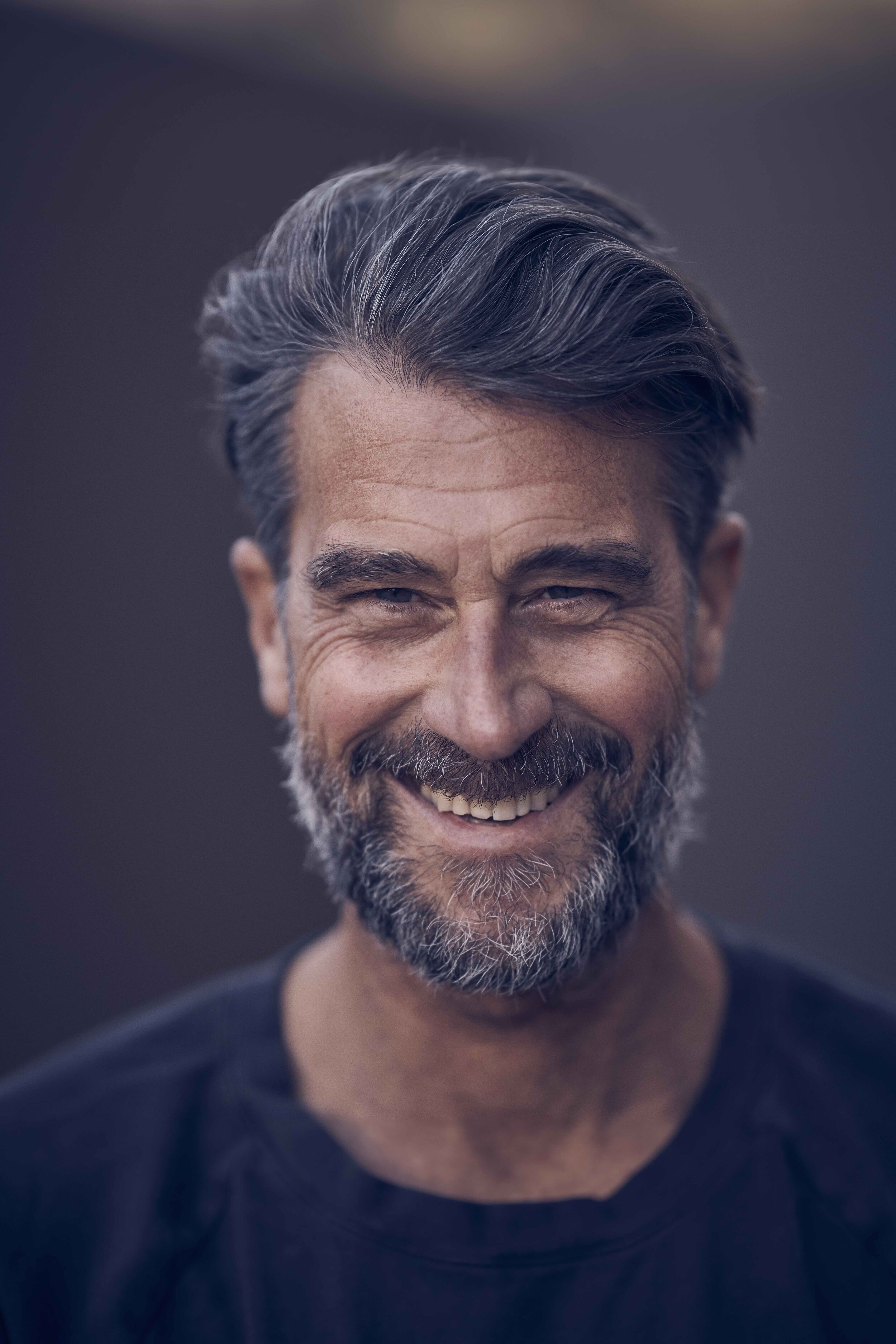
Rich Roll // 📸: Kurt Iswarienko
Who the f*** are you?
Oh my… I think that fundamentally I’m a seeker. I’m a spiritual being having a human experience. I try to not fall prey to labels. People will say, “Oh, you’re a vegan ultra-endurance athlete or you’re a podcaster or you’re a husband or you’re a father.” I’m all of those things. But I’m none of those things either. I think that if anything, I’m somebody who’s just looking to always grow and evolve. If there is a label, I think seeker would be the one.
That’s a hard question. I think anybody who has a quick knee-jerk response to ‘Who are you?’ probably hasn’t thought it through enough. Isn’t that a question we spend our whole lives trying to answer? So that’s the best estimate of how I would answer it right now.
How are you feeling right now?
That’s an interesting question, too. I feel open. I don’t feel defensive, but that’s a very difficult question to answer. I will say also that I’m grateful. I’m grateful for the opportunity to talk to you. I appreciate you coming here. That’s meaningful to me and I’m grateful that I get to have this vocation that’s so rewarding and fulfilling and something that I’m able to do in the middle of Covid when so many people have lost their jobs and are really having a difficult time. So the fact that I can continue to apply my trade in this bizarre moment that we’re all experiencing is something I don’t take for granted.
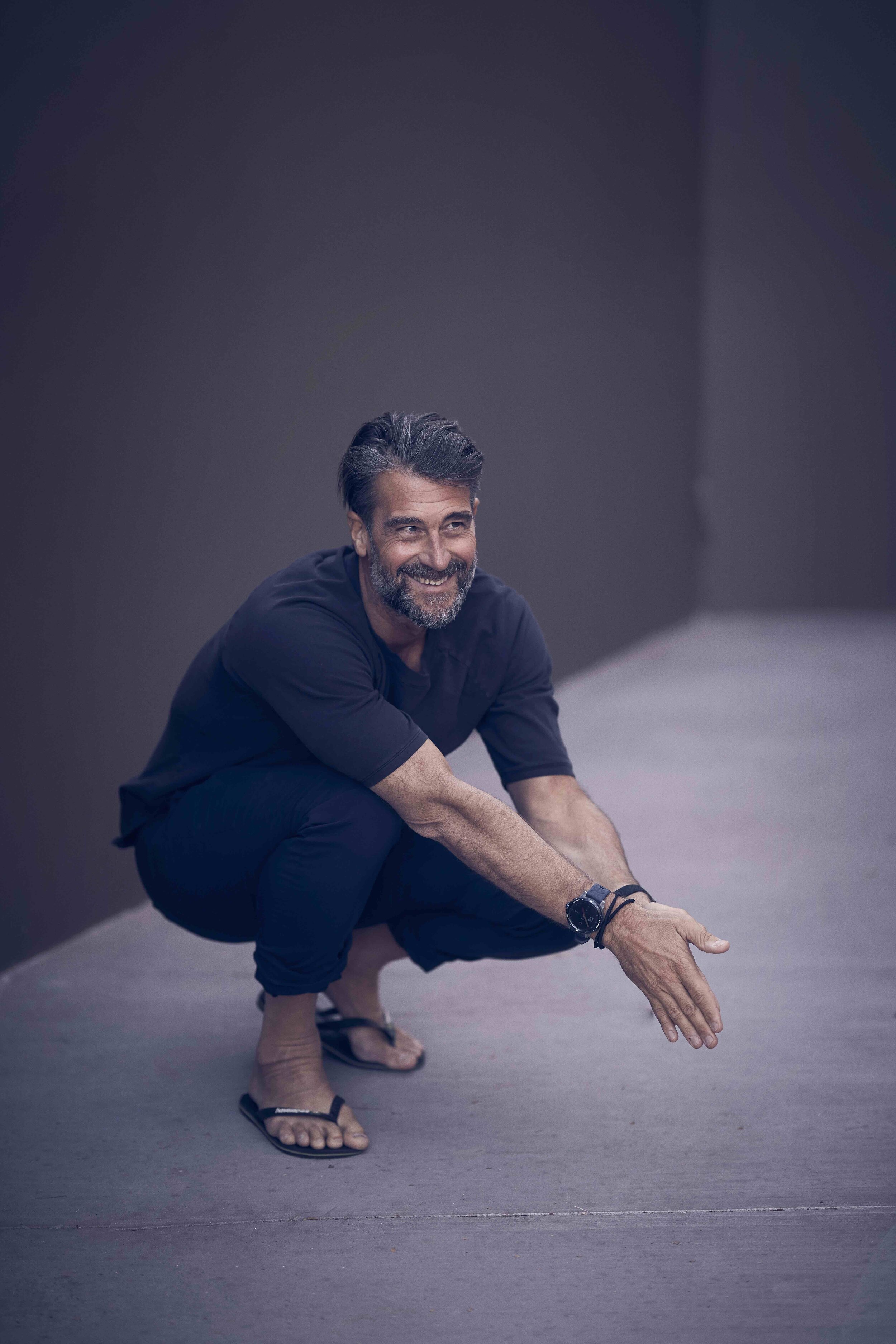
Rich Roll // 📸: Kurt Iswarienko
Where did you grow up and what was it like?
I was born in Michigan, but moved to the Washington DC area when I was about seven, so that’s really where I grew up. I think it was a great place to grow up, the kind of place where you could go out the front door and ride your bike around the neighborhood and just be home by dinner and your parents didn’t sweat it, which is something of a bygone era, I suppose. And it was very much an inside the beltway experience. My father was a government lawyer and I lived in a neighborhood and went to school with the children of politicians. Our next door neighbor was a senator. The director of the FBI lived around the corner, but it was a time of relative comity, in the sense that there were Republicans and Democrats and we all cohabited very well and seamlessly. And I can remember dinner parties in my teenage years where there would be prominent people from each party there, and everybody was having a laugh and getting along just fine. And I think about that a lot because we are so divided right now. We’ve lost the ability to communicate in an effective and healthy way. There is a breakdown in the fabric of our country and how we cohere and how we live amongst each other that causes me great concern, because I had that experience growing up at the heart of what is causing so much pain and division at the moment.
What excites you?
I think the thing that excites me the most, well there’s two things. The first thing is serving this role as an agent or a catalyst for transformation in other people. And that’s really the core of what I try to do with the show and the books and the other things that I do. I’ve had my own evolution and transformation, but to be able to participate on some level, even if at arms length in somebody else’s transformation, to be witness to somebody’s light bulb moment or to see them let go of a behavior pattern that doesn’t serve them or overcome some obstacle in their life, even if small, is what excites me. That’s really what gets me up out of bed in the morning to do this thing. I get all these emails and social media messages of other people’s version of my story, and these letters tend to be incredibly honest and vulnerable. Because of the nature of podcasting and the way that people consume that content with earbuds in, there’s an intimacy to the whole thing. So people feel like they’re in a relationship with me or that I’m their friend or that they know me. And on some level there’s truth to that. So when they write to me, they’re writing as if they’re writing to a friend and they’re telling me things that they don’t tell anybody about their pain and what they’re struggling with and the things they’ve overcome. And I think that’s something that never gets old, so that definitely excites me.
And then the other thing is just watching my kids grow up and seeing them evolve and figure out who they are and what they want to bring expression to in their lives. That’s an exciting experience.
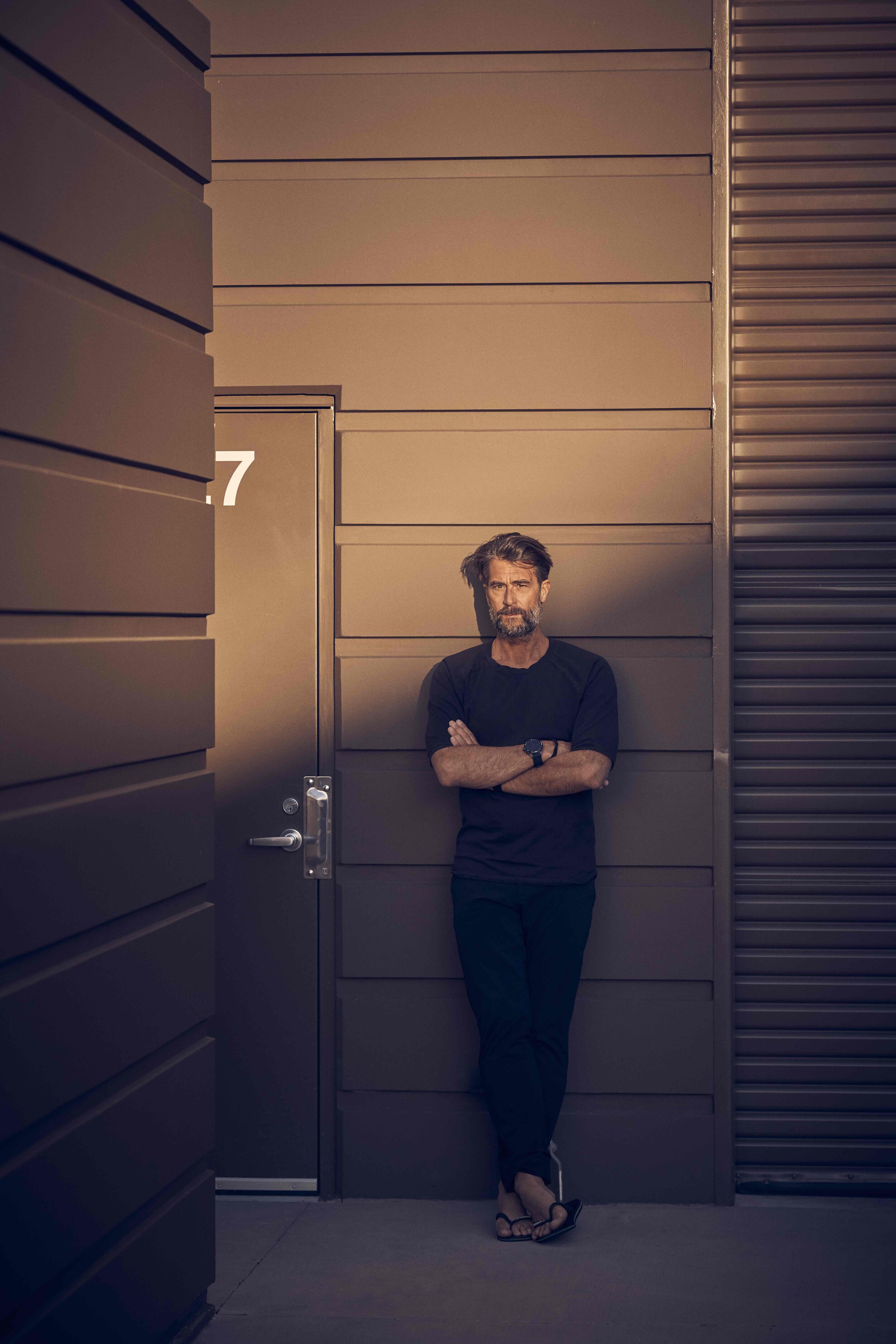
Rich Roll // 📸: Kurt Iswarienko
What scares you?
My teenage daughters.
What is your proudest achievement?
I think my relationship with Julie and the family that we’ve created, by far.
What is the hardest thing that you’ve ever done?
I’ve had a couple of bottoms in my life, but the perfunctory answer is overcoming alcoholism, but I think what was truly harder was weathering complete financial dismantlement through the mid 2000s. And the fact that we really struggled to put food on the table and almost lost our house and had cars repossessed and couldn’t pay our bills. It was a really difficult time that was not momentary. It went on for an extremely long period of time and it really tested my faith and made me question all of my life decisions. So that was extremely hard, but I was able to get through it, really because of Julie’s support, and her trust and her belief in this mission that we’re on together.
Who was your greatest mentor and what did they teach you?
I think Julie’s my greatest mentor. I met her when I was one year sober and I’d never been in a healthy relationship before. I’m not sure I really emanated potential at that time, but she’s somebody who was always able to see a truer version of myself beneath whatever heaviness I was carrying, and she was able to hold that vision. And so through her, I’ve learned the power of trust and faith, and the power of self-inquiry and blazing a unique path.
I wasn’t raised to be an entrepreneur or to think differently or to create some kind of alternative career. I was raised to go to the good school, get the good grades, get the good job and be on this very traditional track, and it was Julie who was able to help me see things more broadly and realize that there were other opportunities for me.

Rich Roll // 📸: Kurt Iswarienko
Who are your fictional and real-life heroes?
To choose a real-life hero among the countless amazing souls that have walked the Earth over millennia presents an impossible choice — so I’ll default to someone currently top of mind: Marcus Aurelius. Not only was he the most powerful man of his time, he was a philosopher who thought deeply about how to live a good and ethical life. An architect of Stoicism, his book Meditations is as relevant today as it was was in 140 AD.
As for a fictional hero, I’m going to go with Yoda — the spiritual embodiment of The Force and the distillation of practical spiritual tenets instructive in living an examined life. Although Star Wars isn’t real, there is wisdom and value in training oneself in the tradition of a Jedi Warrior. How can I face adversity with equanimity? How can mindfulness influence the trajectory of my life and that of others? Yoda is the master guru we all need — now more than ever.
What is your favorite item of clothing in your wardrobe?
A black t-shirt.
What music did you love aged 13 – and do you still love it now?
REM, the greatest band of all time. Being exposed to that around that time, when I was 13 was probably right around when ‘Murmur’ came out, and that just completely changed what I thought music could be, and they still remain my favorite band.
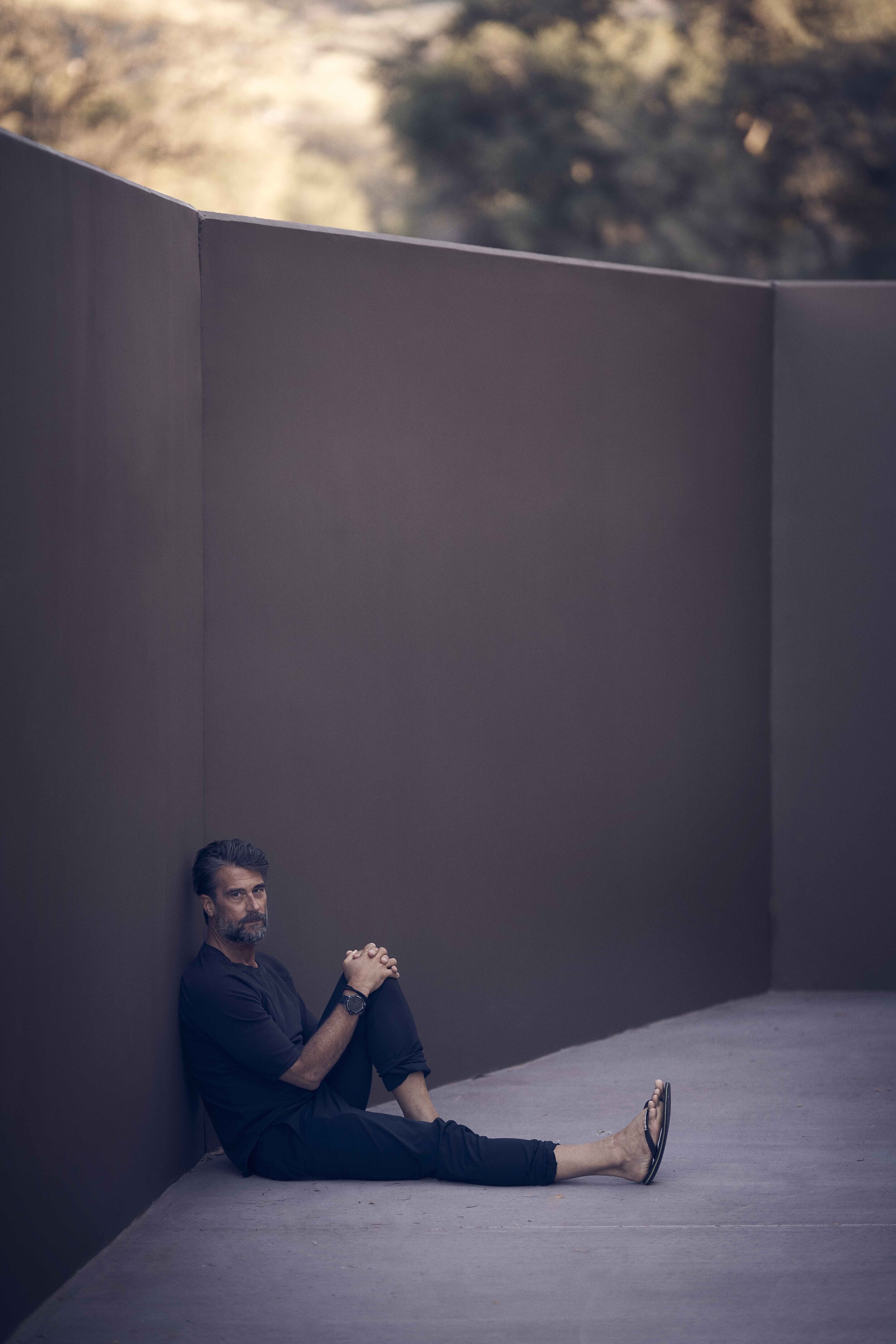
Rich Roll // 📸: Kurt Iswarienko
What is the most inspiring book you’ve ever read?
Probably ‘Autobiography Of A Yogi.’
What is a movie that left a lasting impression on you?
So many movies. That’s a really hard one. Maybe ‘The Graduate.’
What is your favorite word or saying?
Mood follows action. It was something that was said to me very early in sobriety. If you want to change your state, you have to take the action first rather than wait until you feel like doing something. Rather than sitting around and waiting for inspiration to strike, or feeling like you’re in the mood to do something, the change in state that you seek is only a result of taking actions.
What do you want people to say at your funeral?
That he lived his life in service of others.
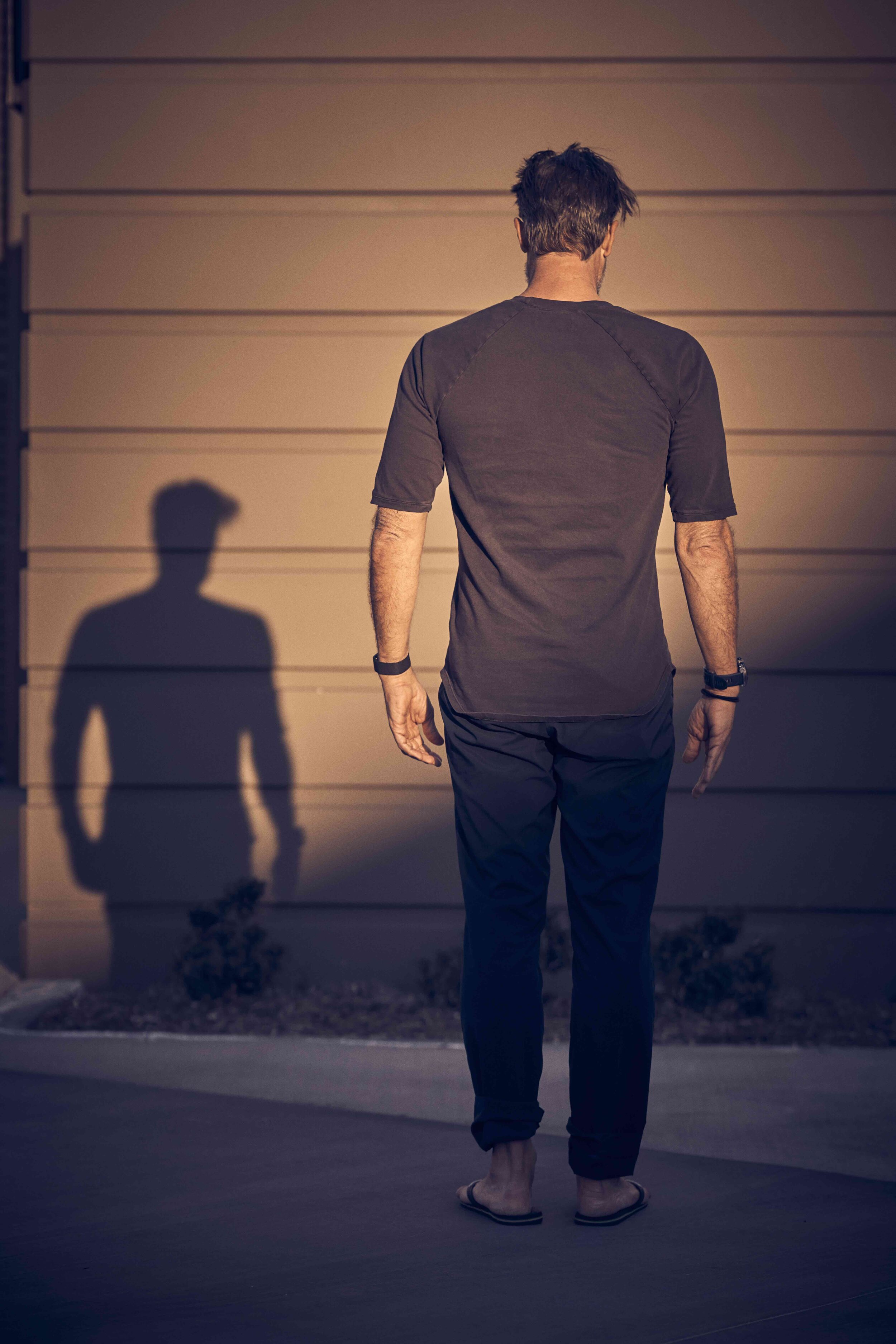
Rich Roll // 📸: Kurt Iswarienko
And finally, a few quickfire favorites…
Car?
1966 Mustang convertible. Navy blue. White interior.
Sports team?
I’ll say the 1986 Stanford men’s swimming team, that I was a member of.
Meal?
Vegan burritos.
Grooming product?
Saltwater from the Pacific Ocean.
Clothing label?
Tom Ford.


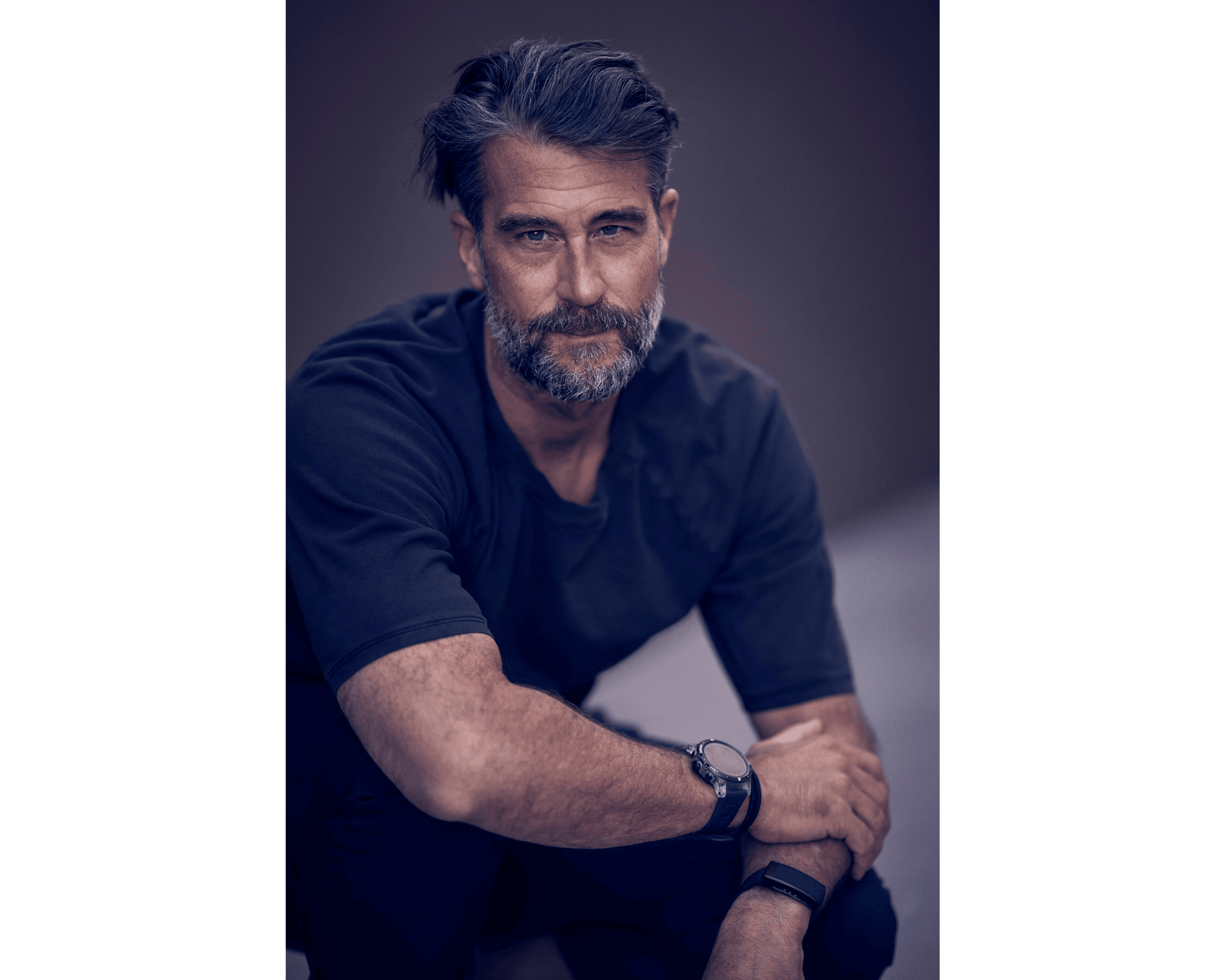


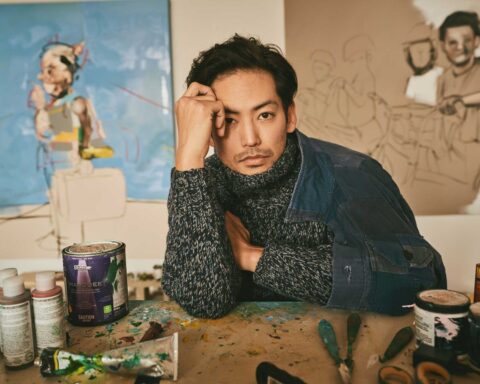




I’ve listened to Rich’s podcast for a couple of years now. He’s brought me stories from all over the world and opened my eyes to guests and subjects I needed to dive more deeply into. Typically, I listen to a podcast, download the guests’ book on Audible, listen to it and then back to Rich for another 2 or 3 podcasts. In fact, your podcast with Rich, John was the reason I discovered mrfeelgood. You both have commonalities in your approach to creating a platform that’s both enriching and meaningful to ‘readers’. The photographer on this also did a stellar job of capturing Rich – California light, negative space and great shapes and forms. Keep ’em coming guys!
Great to hear Richard – he’s the real deal. A wonderful human finding his way and genuinely compelled to share knowledge that supports growth and evolution. A very good man. Thanks for your note.